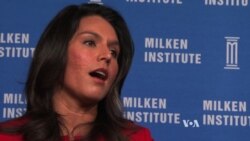The number of women in the U.S. Congress has reached a record high. Women make up 20 percent of the House of Representatives and Senate, but the number is not reflective of the U.S. population, which is 50 percent women. At the Milken Institute Global Conference held in Los Angeles this week, some political insiders explained why a gender gap in U.S. politics exists.
The U.S. Congress is a place of power that is still dominated by men.
“Women only got the right to vote since 1920 and government moves very slow," said Congresswoman Mimi Walters.
Walters, however, says women are making gains. She was part of a panel at the Milken Institute Global Conference that identified some of the reasons more women are not in public office. Hawaii Congresswoman Tulsi Gabbard says one problem is many people have a negative image of the government.
“I think there is a disconnect, especially from the millennial generation from highly successful highly talented people, great innovators, who are saying why should I get involved with this dysfunctional entity called government," said Gabbard.
The women who are interested in running for office may not have the tools to hold a successful election campaign, says Walters.
“You can’t get your message out if you don’t have any money and I think part of the problem for women in raising money is a lot of times women will be in the workforce and do what I did, leave their job and stay home with their kids and then they lose that network of people," she said.
She says those networks fund a campaign. While some challenges women face may not have a simple solution, these panelists say there are things that can be done to get more qualified women to run for office and win.
Lobbyist Laura Cox Kaplan with PricewaterhouseCoopers works with government, regulatory affairs and public policy.
“Talk to your organization about ways in which you can invest in a pipeline of young people. We have created a program in the summer that brings in young college age women that exposes them to people like Mimi and Tulsi, shows them this great example, teaches them a bit about Washington, and helps them realize that this is a dream that can actually be their dream," said Kaplan.
And having women mentors is critical to having more women in politics, says Walters.
“Women have to lead by example and we have to look at the future of our country, and I think it is our responsibility to mentor those young women," she said.
There is the hope that mentorship will show young women what government can be and inspire them to run for office.





